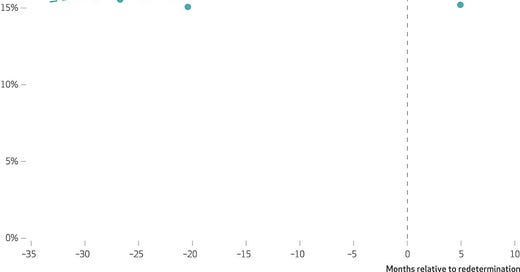Impact of Medicaid ‘unwinding’ on employer-sponsored health insurance (by Patricia Toro, MD MPH)
November 20, 2024
Summary:
Preliminary survey data suggest that the Medicaid “unwinding” has led to fewer without insurance than expected.
Source: Gupta, et al, Health Affairs November, 2024
Medicaid is the insurance program for individuals with lower incomes that is jointly funded by the federal government and the states and administered by each state. During the COVID pandemic, the federal government instructed states not to perform eligibility testing on those who were already on Medicaid, and thus no members were disenrolled. This led to a record number of 94 million Medicaid enrollees in early 2023.
In March 2023, those pandemic rules ended and states phased in their traditional annual eligibility checks to determine whether members could continue to receive Medicaid benefits. At that time, there was concern that widespread disenrollment would lead to a rapid increase in the uninsured in America or large increases in Employer Sponsored Insurance (ESI) enrollment. The actual results are different than anticipated.
This month, researchers published an article in Health Affairs that characterized what seems to have happened to the over 25 million people who were disenrolled as part of this policy change. Approximately half of the individuals who were disenrolled reported that they had ESI. A large proportion of those individuals without ESI reported having other types of private insurance, which could mean that they were able to obtain exchange plans with the additional subsidies that made these more affordable. These additional subsidies will expire at the end of 2025 unless they are renewed by Congress. Results varied quite a bit by state.
Nationally, the number of uninsured individuals in the US increased by 467,000, which did not reach statistical significance. Despite the millions of people who were disenrolled from Medicaid in 2023, nearly 10 million more people remain currently enrolled in Medicaid/CHIP, compared to before the pandemic.
This study is based on survey data, which is available much sooner than formal insurance enrollment reports.
Implications for employers:
Employers may not have seen increased enrollment in Employer Sponsored Insurance (ESI) in 2024 as a result of this change in Medicaid policy.
There may continue to be flows from Medicaid to ESI in 2025 as states evaluate and update their eligibility criteria.
Employers might see incremental enrollment in employer plans if expanded tax credits that cut the cost of exchange plans are discontinued, as expected at the end of 2025.




